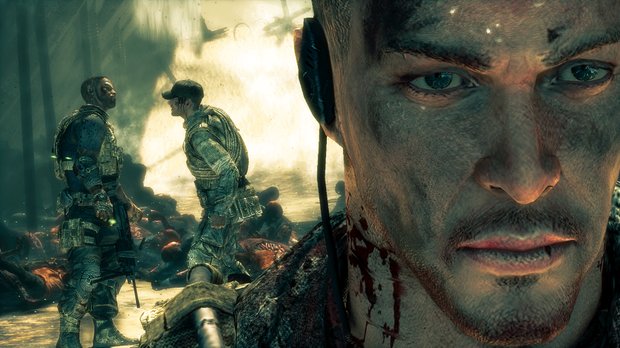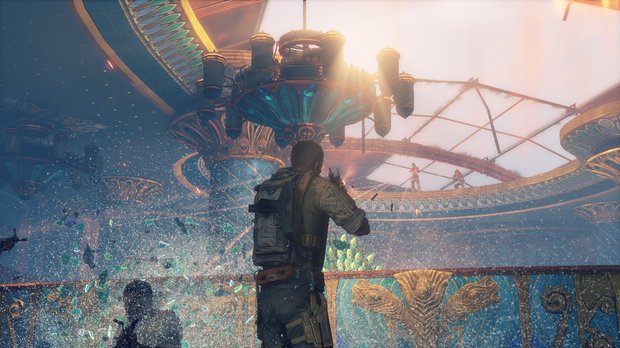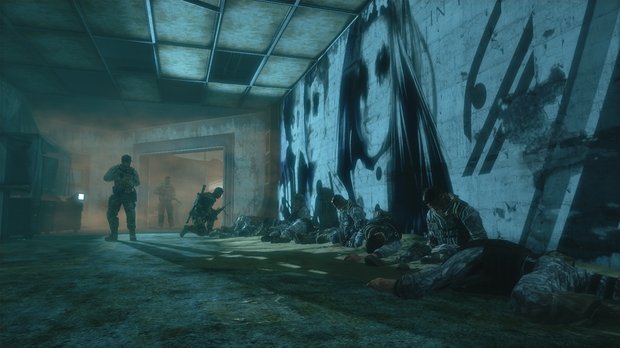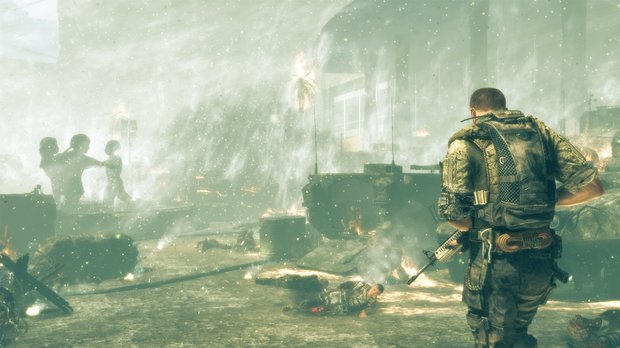How Spec Ops: The Line attempts to shock jaded, desensitized gamers
"War is hell" taken to a new level
We pull the trigger on our Xbox 360 controller, which is actually shaped like the trigger on an assault rifle. Signals are sent to the controller, then to the system, and within milliseconds our on-screen avatar pulls the trigger on his assault rifle, which is actually shaped like the trigger on our Xbox 360 controller. Digital bullets stream from the barrel spraying towards the digital character cowering ahead. We see his head snap back and the game slows down time for a moment, letting us revel in our victory. We watch as digital blood sprays from digital heads onto digital sand. And we continue moving on. We’re monsters. Every last one of us. We’re jaded. Desensitized. Monsters. That’s what Spec Ops: The Line wants us to know, first and foremost. We’re horrible monsters.

Above: Walker's mission gets more complicated every minute he spends in Dubai
That’s what it felt like as we stumbled through a few hours of the game. We entered Dubai, completely ruined by sandstorms, in an attempts to find the cleverly-named U.S. Army Colonel John Konrad, a hero of our Nolan North-voiced protagonist, Captain Martin Walker. But there’s a war going on in Dubai, unbeknownst to everyone on the outside. Konrad’s men are doing battle with natives. And maybe the CIA, too; it was never made completely clear. In fact, the misty, hazy battle lines were important to the story, which felt like it did a fantastic job turning the sand-covered Dubai into a confused, deadly warzone.
2K used this setting to its advantage in order to craft an incredibly dark story, one that feels like it’s attempting to genuinely bring a deeper moral message to the genre. This narrative is weaved between large, set-piece battles which had us seamlessly sliding between cover and taking down enemies with the game’s strong, tight controls. It doesn’t reinvent the Gears of War-style shooter, but it does a good job of aping it and adapting it to the setting. Walker’s two companions are more-than-capable allies, taking down enemies on their own and following our occasional commands while feeling like well fleshed-out characters.

Above: The sandstorm buried most of the city, leaving beautiful buildings underground
On a few occasions we were given the option to destroy windows, walls, and other barriers holding back the sandstorm’s remnants, and while it never provided dynamic or especially strong gameplay it always looked cool and cleared a room in a fantastic display of nature’s wrath. We're hoping there are more inventive uses later in the game, as it feels like there can be more to it than that.
But the gameplay wasn’t what impressed us about Spec Ops. It was competent, sure, but the setting and tone is really what set it apart. It’s a gloomy story, showing the darker side of war without succumbing to the clichés of action movies. We’re not sure that we’re playing as heroes. We’re there to save people, and to save our country’s citizens, but at what cost? We don’t know. Spec Ops made us question our actions when it gave us a choice – which it did on a few occasions.
Weekly digests, tales from the communities you love, and more
Once we were asked if we wanted to attempt to rescue a person of interest or attempt to save a handful of citizens. We took down the targets and tried – and failed – to save our contact. We weren’t sure if it was the right decision to make. It didn’t feel like it was. But if we had gone the other way and tried to save the people, we feel like it might have ended the same way. Later we saved one of Konrad’s men from a CIA operative that was torturing him. He pointed a gun at us next, and we could have taken him down. We didn’t. He got away. Soon after, his allies started attacking us. Shouldn’t he have told them that we saved him? Did he trust us? Would we have trusted us?

Above: We found executed soldiers in several locations
We trudged on, killing our fellow men in uniform because we had to. Our characters screamed desperately at them, “We’re not CIA!” They’d keep firing. We’d shout again, “Doesn’t the term friendly fire mean anything to you? Stop shooting!” But they didn’t. They wanted us dead, so we had to kill them. Eventually we came to a group too large to fight through, at least without some heavy armaments. One of our squad mates pointed to a nearby weapon: white phosphorus.
Earlier we came across innocents who had this weapon used against them, their bodies scorched, their flesh aflame.
“We can’t use this on them, they’re US soldiers” one of our teammates pleaded.
“We don’t have a choice,” Walker replied.
We walked over and took control, raining down fire on our enemies. Though it looked like the AC-130 mission from Call of Duty it certainly didn’t feel like it. It wasn't fulfilling. They didn’t stand a chance. There was no satisfaction.

Above: Mercy killing has little in-game purpose besides silencing screams and gurgles
As we walked through the battle zone, watching our fellow citizens scream for mercy, we couldn’t help but put them out of their misery. We weren’t shooting them because they were a threat. Or because we had to. We just wanted to stop their screaming – digital or not, it was chilling. For a moment, we thought the segment would have been a lot more impactful if the game didn’t make us do it. If it had given us the chance to just fight through the enemies without the torturous weapon, then we might feel worse about our inhumane slaughter.
And then we realized something horrific: we would have used the white phosphorus either way. In fact, we didn’t even wait to find out if we had to. We may have had a choice. We didn’t check. We just walked over to the gun and started shooting. Pulling our trigger-shaped buttons and slaughtering defenseless soldiers.
We’re horrible monsters.
Hollander Cooper was the Lead Features Editor of GamesRadar+ between 2011 and 2014. After that lengthy stint managing GR's editorial calendar he moved behind the curtain and into the video game industry itself, working as social media manager for EA and as a communications lead at Riot Games. Hollander is currently stationed at Apple as an organic social lead for the App Store and Apple Arcade.



